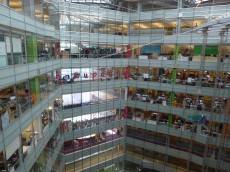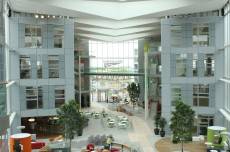January 6, 2014
New SkyCycle route proposed to ease Capital’s transport network congestion
 Demand for London-based workplaces is increasing, but the capital’s transport network is at capacity and ill equipped for a predicted population growth of 12 per cent over the next decade. Despite the Mayor’s efforts to encourage more cycling in the capital, a recent series of accidents has raised concerns about its safety. Architects Foster + Partners together with Exterior Architecture and urban planners Space Syntax have come up with a proposed solution, the SkyCycle network. This consists of a wide, secure deck constructed above the existing suburban railway corridors, to provide over 220 kilometres of safe, car free cycle routes which can be accessed at over 200 entrance points. Each route can accommodate 12,000 cyclists per hour and will improve journey times by up to 29 minutes. More →
Demand for London-based workplaces is increasing, but the capital’s transport network is at capacity and ill equipped for a predicted population growth of 12 per cent over the next decade. Despite the Mayor’s efforts to encourage more cycling in the capital, a recent series of accidents has raised concerns about its safety. Architects Foster + Partners together with Exterior Architecture and urban planners Space Syntax have come up with a proposed solution, the SkyCycle network. This consists of a wide, secure deck constructed above the existing suburban railway corridors, to provide over 220 kilometres of safe, car free cycle routes which can be accessed at over 200 entrance points. Each route can accommodate 12,000 cyclists per hour and will improve journey times by up to 29 minutes. More →














 The finest closing sentence of any novel in my opinion is that in The Great Gatsby. “So we beat on, boats against the current, borne back ceaselessly into the past.” It is a reference to the futility of our attempts to escape the past, even as we look to the future, dreaming of how “tomorrow we will run faster, stretch out our arms farther”. F Scott Fitzgerald was referring to people when he wrote it, and Jay Gatsby in particular, but it’s a passage that resonates in a number of ways, especially in those areas of our lives that deal most intimately with what it means to be human. And one of these is self-evidently the workplace, where any articular attempt to define the ideal office for a particular time, including the future, is complicated by the fact that we must always meet the needs of the beasts that inhabit it. Regardless of the tools we have at our disposal with which to work more effectively, or just plain ‘more’ we remain fundamentally the same animals we were thousands of years ago.
The finest closing sentence of any novel in my opinion is that in The Great Gatsby. “So we beat on, boats against the current, borne back ceaselessly into the past.” It is a reference to the futility of our attempts to escape the past, even as we look to the future, dreaming of how “tomorrow we will run faster, stretch out our arms farther”. F Scott Fitzgerald was referring to people when he wrote it, and Jay Gatsby in particular, but it’s a passage that resonates in a number of ways, especially in those areas of our lives that deal most intimately with what it means to be human. And one of these is self-evidently the workplace, where any articular attempt to define the ideal office for a particular time, including the future, is complicated by the fact that we must always meet the needs of the beasts that inhabit it. Regardless of the tools we have at our disposal with which to work more effectively, or just plain ‘more’ we remain fundamentally the same animals we were thousands of years ago.









January 21, 2014
Working from Home Week: good idea, but it doesn’t suit everyone
by Sara Bean • Comment, Flexible working, Workplace
Yesterday was hyped as the most depressing day of the year, but it also marked the beginning of Working from Home Week (20-26 January 2014). The idea will resonate with anyone struggling to get out of bed and join the January commute. There are many advantages to home working; but depending on your personality and personal circumstances there are also disadvantages. Yes, you’ll avoid traffic jams/crowded trains, take the dog for a walk when you fancy and can concentrate on a project without annoying interruptions. But working from home has its disadvantages too; including feeling isolated and finding it difficult to remain motivated. Rather like those who decide to move to the country but find it’s too quiet – for some people the buzz of the workplace is vital to their productivity and wellbeing. More →